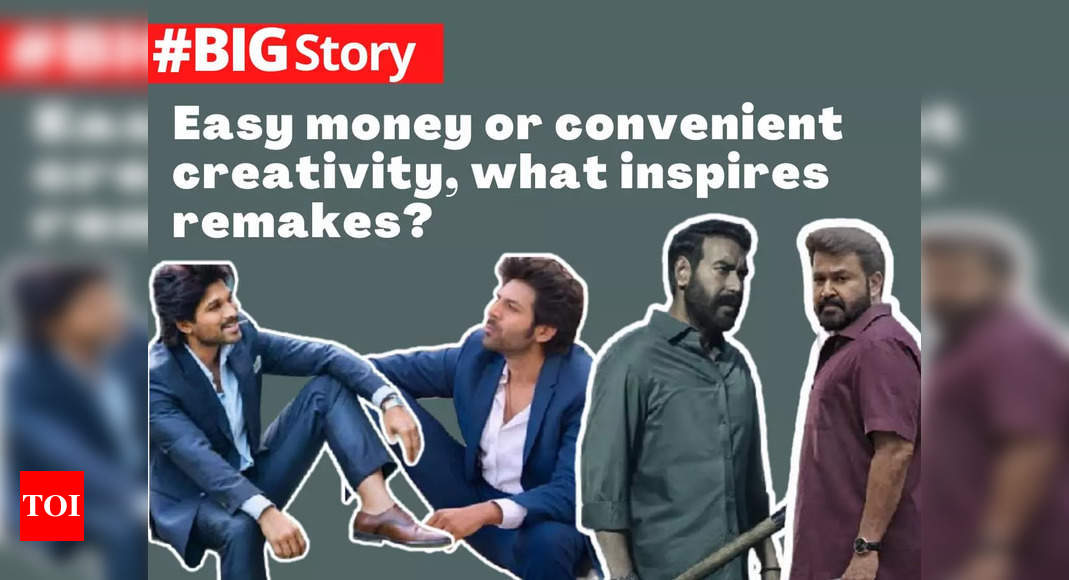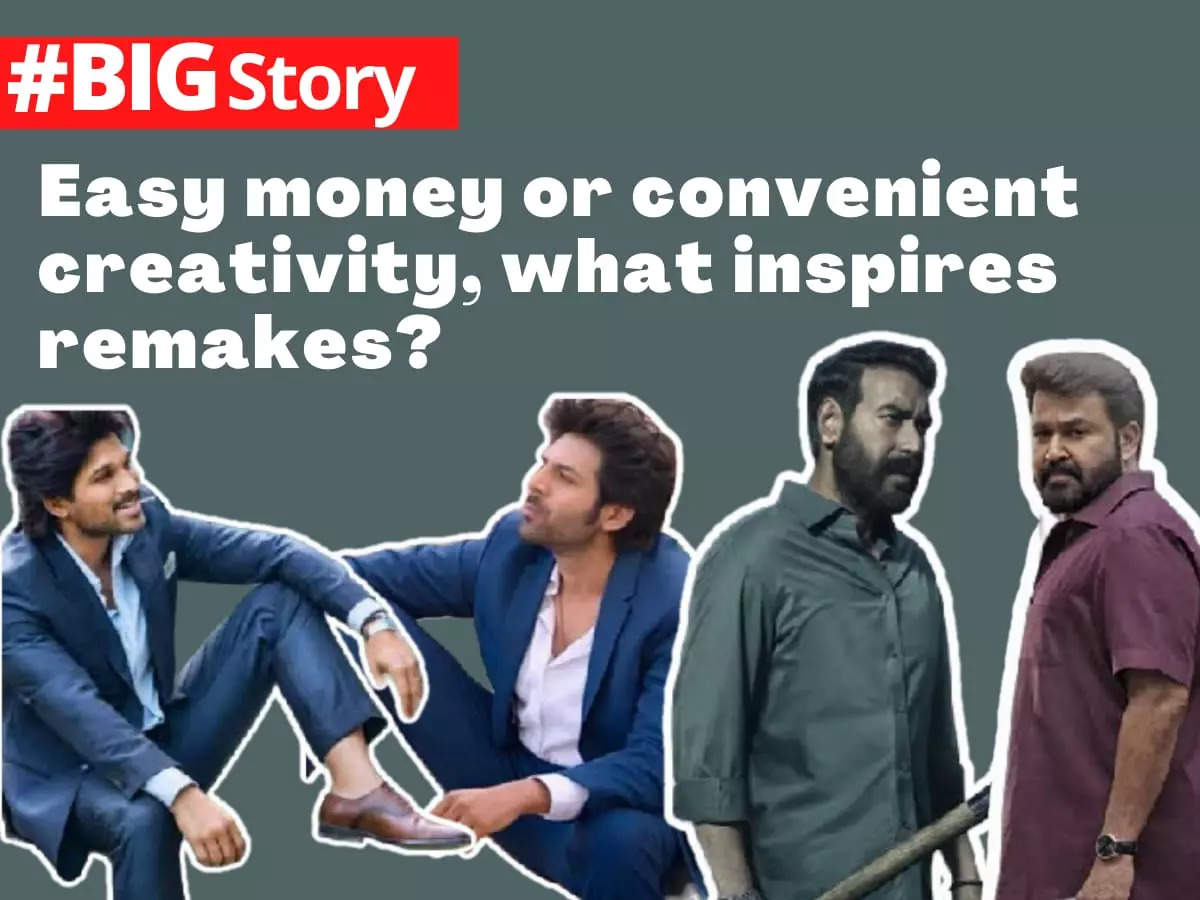Remakes! Are they a boon or bane? – Big Story – Times of India
Over the years, the Indian movie industry, especially Bollywood, has remade thousands of films. In most cases, when a regional language (Hindi too is a regional language, but that’s a debate for another day) film fares well at the box office, it naturally finds makers who are willing to pay a whopping amount to bag the remake rights. While some remakes succeed to impress, even though not as much as their originals, a few go down like a lead balloon. But the million-dollar question really is, have the remakes really been beneficial for the film industry?
Popular movies that were remade!
Though movies with original content perform well, there are a few films that managed to not lose the charm. There are a few scenarios in the regional film industry that proved that remakes are truly beneficial. Case in point, the Tamil film ‘Chandramukhi’, starring Rajinikanth and Jyothika performed way better than the original Malayalam film ‘Manuchitrathazhu’, though the performances were highly criticized. ‘Chandramukhi’ still stands as the only Tamil movie that ran in theatres for 535 days. Rajinikanth as an actor has acted in more than 11 remakes that had Amitabh Bachchan as the lead in Hindi films. Billa (1980), Padikkathavan (1985), Mr. Bharath (1986), Velaikkaaran (1987), Dharmathin Thalaivan (1988) and Panakkaran (1990), to name a few.
Rebuild, don’t remake
Remakes always have a bad reputation for not matching up to the standards of their original, and Malayalam filmmaker Jeo Baby agrees with it.
Known for the breakout movie of 2021, ‘The Great Indian Kitchen’, which was a big blow on the age-long sexism that chains women to kitchens and household chores, Jeo Baby thinks remakes can finally shed their bad name if the approach is slightly changed. “So far, remakes have never excelled over their original counterparts. This is because of the perspective of how one conceives a remake. Rather than blandly reshooting in another language, if a filmmaker comes across a movie, which influences him to ‘rebuild’ it, it could open a sea of possibilities! Look at the fabulous films that have been made out of literature.”
Jeo Baby tells us that the intent of remakes, however, mostly relies on their business these days, “Makers often remake a certain film, expecting that they could achieve a similar success and box office triumph the original did.” Ask Jeo Baby if any remake has thrilled him more than the original, “I have hardly seen remakes, but I like ‘Udhaharanam Sujatha’, which was a remake of the Hindi film ‘Nil Battey Sannata’. Both films were good because they were curated as per the sensibilities of the audience.”
Tamil filmmaker Mohan Raja considers remakes from a different perspective. “To a director, the remake of a film is like an adopted child, and winning the love of the child is a success. The reality is you will always be criticized for not giving birth to it though it turns out to be a blockbuster,” he shares.
Producer Ratan Jain, who has backed Priyadarshan’s Hulchul (2004), a remake of the Malayalam Godfather (1991) says, “Reasons for remaking a Malayalam film are different from reasons for remaking a Telugu film. Usually, from a producer’s perspective we have seen that when you pick a larger-than-life Telugu film, Hindi superstars generally don’t disagree to sign the film.” He acknowledges the fact that a dearth of creativity can be conveniently filled with a remake. Jain adds, “The biggest problem in the Hindi film industry is that we don’t have enough scripts. We are either focussed on biopics or remakes. The advantage of remaking a South film is the fact that you get a read-made script. Actors also agree to do these films because they get a ready reference from the South star’s performance.”
Curate remake as per audience’s sensibilities
Looking at the films remade from other languages, it is believed that Malayalam, Marathi, and Tamil film industries churn out more original content in comparison.
Filmmaker Jeethu Joseph, who is a household name to movie buffs across the globe, thanks to his blockbuster franchise ‘Drishyam’, which was remade in multiple Indian and foreign languages, believes curating the content according to cultural differences is vital while remaking, however, in that process the very essence of the film should not be lost.
“It’s important to understand the regional sensibilities and culture when you are remaking a film. For instance, when my ‘Drishyam’ was remade in other languages, the Christian prayer meeting was shifted to a Hindu context, considering the regional differences. It was essential that the concept is familiar and local, only then the audience would be able to connect,” says Jeethu Joseph.
Remaking is not that easy!
Though it might look like a piece of cake to remake a film, it is hard as the story is already known to the audience in the best way possible. While remaking a film, a director’s responsibility far exceeds when he or she is producing his or her own original story. Stressing the added responsibility, director Mohan Raja shares, “While remaking a film, the responsibility is different. You have to observe the child (original movie) before acting on it. Knowing whether it makes you laugh or cry and then deal with it. We need to make sure that we see the remake film, nothing less of your own original story.”
Anees Bazmee who has remade Charlie Chaplin (2002) as No Entry (2005) echoes similar thoughts. He says, “Only the big super hits are considered for remakes. That’s because a hit film assures the fact that the concept is saleable. There are minor differences in the sensibilities of South audiences and North audiences and that was the only change one had to make while remaking a hit film. The most difficult aspect of filmmaking, the writing process becomes easy in the system of remakes. The process of writing, which would take one year, could be completed in one month with a remake.”
A tribute to the original script
While a movie is remade in another language, it has its both advantages and disadvantages. The original film gets a lot of exposure as a new set of audiences discover the film that is relatable to them and appreciate the original movie as well. Though the remade movie is culturally adapted based on the language and demographics, it is still an added value to the original movie. Agreeing with this point, director Jeethu Joseph looks at the beneficial side when a film is remade. “As a storyteller, I want my tales to find the maximum number of audiences, and that’s where remakes come in. It brings me a lot of happiness that my film travels beyond my home state. This in turn also helps the industry to grow and receive more visibility,” he adds.
Filmmaker Jeo Baby too does not mince his words, while speaking about how the remake benefits everyone. His celebrated ‘The Great Indian Kitchen’ has been remade in Tamil and is currently streaming on a popular OTT platform, “I cannot deny the fact that how much these remakes help filmmakers like me, because in most cases, the remake rights bring in more financial ground than creating a whole movie.”
Focusing on original does not hurt
The Marathi movie industry has time and again produced original content, and the filmmakers currently want to keep doing that. “When it comes to Marathi cinema, the people are proud of their lineage, culture and their literature. In Bollywood, we have films that are more commercial. But when it comes to Marathi cinema, people want to see films that have deep rooted content and not commercial fare. I feel for the Marathi industry, content is king,” shares actor Sachin Khedekar.
Actor Sumeet Raghavan is on the same page as he adds, “I feel Marathi literature is a rich source. From PL Deshpande and Kashinath Ghanekar to Vasantrao Deshpande, their contribution to the industry is simply amazing. Our culture is beautiful. People still visit theatres to watch Marathi dramas and plays. I was part of the biopic on ‘Kashinath Ghanekar’. Today’s generation might not be aware of him, but people from the ’70s and ’80s have seen Kashinath Ghanekar. I feel that we have ample material to make good films with original content.”
Are pan-Indian movies a boon or bane?
Pan-Indian releases are the new trend. Many films, especially from the South getting dubbed in multiple languages, at least the five major ones – Hindi, Telugu, Tamil, Malayalam, Kannada. If not in five languages, the director at least releases them in two, as it helps them in earning more money at the box office. With the films being released pan India, it stops the thought of being remade in other languages.
Filmmaker Jeethu Joseph, whose holy grail is the ‘Drishyam’ franchise, which added billions to the Indian entertainment industry, however, thinks it’s better to shoot in multiple languages, rather than filming in one and dubbing in other languages. He says, “I am not a fan of dubbed movies. I would prefer shooting it as a multilingual film, with each of the actors, speaking in different languages, over the dubbed films. I cannot enjoy a dubbed film, because the experience of hearing Malayalam, when the actor is clearly speaking in Hindi, looks funny. Look at the Hollywood films that get dubbed into Malayalam. Those might work well when it comes to earning money, but they won’t really connect with the audience and the experience of watching the film is far from ideal. In the case of ‘Baahubali’, since it was a visual treat, watching its dubbed version would have been okay. But even then, I preferred to watch in Telugu with English subtitles, which gave me a wholesome experience. There is a charm to watching a film in its original language.”
Remakes are a vanishing trend
Tamil film Love Today is being remade with Aamir Khan’s son Junaid and Boney Kapoor’s daughter Khushi Kapoor. The upcoming release Gumraah featuring Aditya Roy Kapur and Mrunal Thakur is a remake of the Tamil movie Thadam. Bholaa is an adaptation of the Tamil hit Kaithi, Akshay Kumar has just announced the shoot of the official remake of Soorarai Pottru. It would seem remakes are going to rule the roost. But Bollywood’s makers certainly don’t seem to agree. Producer Ratan Jain feels remakes are passé now. He reasons, “It makes absolutely no sense to remake big-budget South films. Thanks to the OTT, the world has become an even smaller place. Most big-ticket Telugu films are either dubbed in Hindi or are released with English subtitles. So this process allows the prospective audience of a subject to watch the original movie even if they don’t speak the language natively.”
Anees Bazmee supports the argument and explains, “Audiences in the South wouldn’t watch that many Hindi films, so remaking a Hindi film used to ensure a new story for them. Likewise, Hindi audiences wouldn’t watch too many South movies, so remaking a South title used to make sense for a Hindi producer. But that phase is over now. With the Pan-India release trend catching pace, I don’t think it’s a good idea to remake South films in Hindi anymore and vice versa.”
The writing really isn’t on the wall yet. But if the OTT platforms can get their act together in the next few years, remakes could well be a thing of the past.
For all the latest entertainment News Click Here


